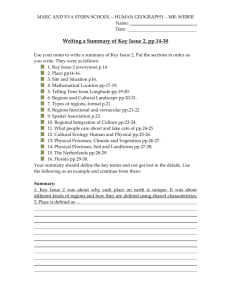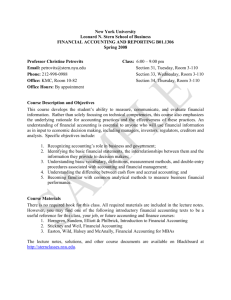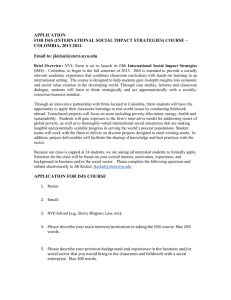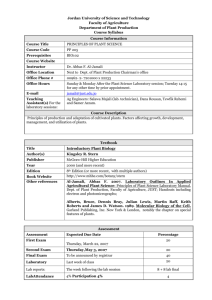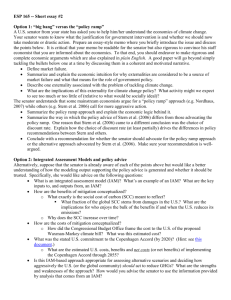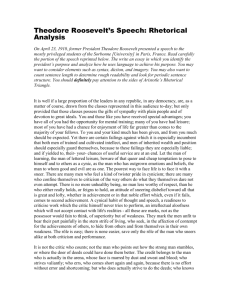Case # 5 - Pearsoncmg
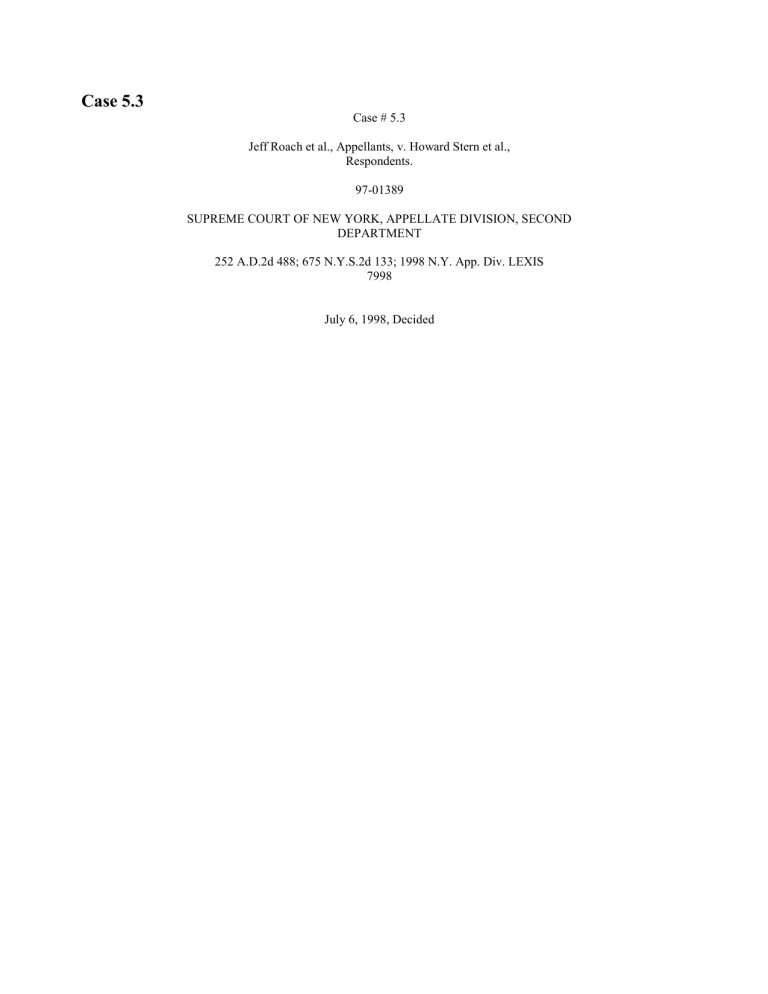
Case 5.3
Case # 5.3
Jeff Roach et al., Appellants, v. Howard Stern et al.,
Respondents.
97-01389
SUPREME COURT OF NEW YORK, APPELLATE DIVISION, SECOND
DEPARTMENT
252 A.D.2d 488; 675 N.Y.S.2d 133; 1998 N.Y. App. Div. LEXIS
7998
July 6, 1998, Decided
PRIOR HISTORY: [***1]
In an action, inter alia, to recover damages for the intentional infliction of emotional distress, the plaintiffs appeal from an order of the Supreme Court, Kings County
(Huttner, J.), dated January 13, 1997, which granted the motion by the defendants Howard Stern and Infinity
Broadcasting, Inc., pursuant to CPLR 3211 (a) (7) and (1) to dismiss the complaint.
DISPOSITION: ORDERED that the order is reversed, with costs, the motion is denied, and the complaint is reinstated.
CORE TERMS: decedent, outrageous, cause of action, sister, rib, radio, bone, severe emotional distress, outrageous conduct, matter of law, emotional distress, skull, civilized community, intolerable, utterly, intentional infliction of emotional distress, radio station, cremated, bottom, teeth, thick, air, ash, emotional injury, outrageousness, atrocious, rigorous, genuine, decency, trivial
COUNSEL: Connors & Sullivan, P.C., Brooklyn, N.Y.
(Ralph Young of counsel), for appellants.
Debevoise & Plimpton, New York, N.Y. (Bruce P. Keller,
Jeremy Feigelson, and Peter Johnson of counsel), for respondents Howard Stern and Infinity Broadcasting, Inc.
JUDGES: O'Brien, J. P., Santucci and Florio, JJ., concur.
OPINION: [*488] [**133] Ordered that the order is reversed, with costs, the motion is denied, and the complaint is reinstated.
This lawsuit concerns events that occurred during a radio show hosted by the defendant Howard Stern, which was videotaped and later aired on a cable television station. The participants in the program handled and made crude remarks about the cremated remains of the plaintiffs' [***2] sister, Deborah [**134] Roach. We conclude that the plaintiffs have sufficiently pleaded a cause of action to recover damages for the intentional infliction of emotional distress and therefore the Supreme
Court erred in dismissing their complaint.
The deceased, Deborah Roach, who used the name
Debbie Tay, was described in a newspaper article following her death as a topless dancer, cable-access TV host, and perennial guest on Howard Stern's radio show.
Stern gave her the label "Space Lesbian" based on her stories of encounters with aliens. After Tay's death in
April 1995 her sister, the plaintiff Melissa Roach Driscol, had the body cremated and gave a portion of the remains to the defendant Chaunce Hayden, Tay's close friend.
Driscol asserted that she did so with the understanding that Hayden would "preserve and honor said remains in an appropriate and private manner".
According to the complaint, sometime in July 1995
Hayden engaged in certain "on air" conversations with
Stern during his radio show about Tay's death and the disposition of her remains. Upon learning that Stern had encouraged Hayden to appear on the radio show and to bring Tay's remains with him, her brother, [***3] the plaintiff Jeff Roach, telephoned the producer of the show and the manager of the radio station to demand that such conversations cease. Nevertheless, on July 18, 1995,
Hayden brought a box containing Tay's cremated remains to the radio station. Thereafter Stern, Hayden, and other
[*489] participants in the broadcast made comments about the remains while handling various bone fragments.
The radio show was videotaped and later broadcast on a national cable television station.
The transcript and videotape of the show, which were made available to the court, corroborate the allegations in the complaint that Stern at one point donned rubber gloves and held up certain bone fragments while he guessed whether they came from Tay's skull or ribs. The on-air discussion included the following:
"VOICE: What's in the bottom?
"C. HAYDEN: They look like clam shells.
"ROBIN QUIVERS: Boy, that's wild.
"VOICE: Dig down. That's not normal, is it?
"H. STERN: Chew on it, Chaunce.
"R. QUIVERS: There you go.
"VOICE: What's it taste like?
"VOICE: It tastes like Cracker Jacks, maybe there's a prize in the bottom.
"R. QUIVERS: Boy oh boy, yeah, you're not kidding
Chaunce. [***4]
"H. STERN: Look at the hunks.
"R. QUIVERS: Woooooh!
"H. STERN: Come here, I'll glue her together, give me that, Robin. Let me see that.
"R. QUIVERS: I'm shaking her bones.
"C. HAYDEN: Shake, rattle and roll.
"VOICE: Want me to get some Krazy Glue?
"H. STERN: Let me see this.
"(H. STERN PICKS UP A PIECE)
"VOICE: It's easy ... the leg bone's connected to the ...
"H. STERN: Look at the size of this! That looks like a piece of her head.
"R. QUIVERS: I don't know, I've never seen an actual skull bone, that looks awfully thick.
"VOICE: Looks like a potato or something ...
"C. HAYDEN: It's not normal ...
[*490]
"H. STERN: Heh! Heh! Heh! Heh!, Chaunce, watch your language, huh dude!? Rob, here you want to hold
Debbie? C'mon man, you like her.
"VOICE: Oh man!
"R. QUIVERS: What's wrong with you, Ralph?
"VOICE: Ralph made this so Chaunce could wear it around his neck.
"H. STERN: A big bag.
"R. QUIVERS: Bag.
"H. STERN: Hey Chaunce, why don't you wear that plastic bag around your neck? You can carry Debbie with you. It would be a big necklace, look at that. There she is, what do you think that is [**135] though? Let me see if I can piece [***5] it together.
"VOICE: Its gotta be a piece of skull, doesn't it Robin?
"R. QUIVERS: I've never seen how thick the skull is.
"H. STERN: Alright, hold it, hold ... Ralph hold up this picture of Debbie so I can ...
"R. QUIVERS: It's awfully thick.
"H. STERN: Alright, let's see, this matches ...
"C. HAYDEN: Well, she was very thickboned.
"VOICE: That's gotta be her teeth.
"VOICE: That's her head, that's a piece of her teeth.
"VOICE: Here's a temple.
"R. QUIVERS: But it's not rounded, why would you say that ...
"H. STERN: She had a square jaw. This looks like the breast, oh wait, here's her tooth.
"R. QUIVERS: Why don't you think there are any teeth?
"H. STERN: What do you think this is, this looks like her ribs. What do you think this is, Chaunce?
"voice: I say it's a rib. It's a rib. Yeah, it's a rib.
"R. QUIVERS: Yeah, look at that curve.
"H. STERN: That's a rib? Oh yeah, wow, she was a piece of ash. Alright, very good. Alright, there you go, very good.
"R. QUIVERS: Man.
"VOICE: Are there any bigger pieces on the bottom?"
[*491]
The plaintiffs commenced this action against Stern,
Infinity Broadcasting, Inc. (hereinafter Infinity), the
[***6] owner of the radio station, and Hayden, in which they alleged, inter alia, that the defendants' conduct caused them severe emotional distress. Stern and Infinity moved to dismiss the complaint pursuant to CPLR 3211
(a) (7) and (1) on the ground that the allegations failed to state a cause of action. The Supreme Court granted the motion and dismissed the complaint.
We agree with the Supreme Court that the allegations in the complaint fail to state a cause of action against the moving defendants to recover damages for interference with or mishandling of a corpse. In general, such a cause of action requires a showing of interference with the right of the next-of-kin to dispose of the body (see, e.g., Darcy v Presbyterian Hosp., 202 NY 259; Foley v Phelps, 1 App
Div 551; Finley v Atlantic Transp. Co., 90 Misc 480, affd
172 App Div 907, affd 220 NY 249; Correa v Maimonides
Med. Ctr., 165 Misc 2d 614; see also, Johnson v State of
New York, 37 NY2d 378, 382).
The moving defendants did not interfere with the plaintiffs' decision to cremate the body and divide [***7] the ashes with Hayden.
The Supreme Court further determined that, while the conduct complained of in the complaint was "vulgar and disrespectful", it did not rise to the level of outrageousness necessary to maintain a cause of action to recover damages for the intentional infliction of emotional distress. In order to impose liability for this intentional tort, the conduct complained of must be " 'so outrageous in character, and so extreme in degree, as to go beyond all possible bounds of decency, and to be regarded as atrocious, and utterly intolerable in a civilized community'
" ( Murphy v American Home Prods. Corp., 58 NY2d 293,
303, quoting Restatement [Second] of Torts § 46 [1], comment d; see also, Howell v New York Post Co., 81
NY2d 115, 122).
The element of outrageous conduct is "
'rigorous, and difficult to satisfy' ", and its purpose is to filter out trivial complaints and assure that the claim of severe emotional distress is genuine ( Howell v New York
Post Co., supra, at 122, quoting Prosser and Keeton,
Torts § 12, at 60-61 [5th ed]). A court may determine, as a matter of law, that the alleged behavior is [***8] not sufficiently outrageous to warrantthe imposition of liability ( Howell v New York [**136] Post Co., supra, at 122).
Upon our review of the allegations in the case at bar, we conclude that the Supreme Court erred in determining that the element of outrageous conduct was not satisfied as a matter of law (see, e.g., Bunker v Testa, 234 AD2d 1004;
Flatley v Hartmann, 138 AD2d 345; Esposito-Hilder v
SFX Broadcasting; [*492] 171 Misc 2d 286, affd 236
AD2d 186).
Although the defendants contend that the conduct at issue was not particularly shocking, in light of
Stern's reputation for vulgar humor and Tay's actions during her guest appearances on his program, a jury might reasonably conclude that the manner in which Tay's remains were handled, for entertainment purposes and against the express wishes of her family, went beyond the bounds of decent behavior.
We further conclude that the remaining elements necessary to establish a cause of action to recover damages for the intentional infliction of emotional distress
(see, Howell v New York Post Co., supra) were also
[***9] sufficiently pleaded in the complaint.
Accordingly, the appellants' motion to dismiss the complaint is denied.
O'Brien, J. P., Santucci and Florio, JJ., concur.
DISSENTBY: KRAUSMAN
DISSENT: Krausman, J., Dissents and votes to affirm the order appealed from, with the following memorandum:
The majority decision amply demonstrates that Howard
Stern and his cohorts behaved in a manner that some would find inappropriate when Chaunce Hayden came on the show with the decedent's remains. Certainly, many would consider their remarks and conduct in handling the decedent's remains tasteless, offensive, and insensitive to the feelings of the plaintiffs, who lost their sister to a drug overdose at the age of 27. However, I disagree with the majority's view that Stern's actions give rise to a cognizable legal right to recover damages for emotional distress.
At common law, emotional injury was not recognized as an independent basis for the recovery of damages, primarily because of the ease with which emotional injury could be "feigned without detection" ( Mitchell v
Rochester Ry. Co., 151 NY 107, 110).
While modern tort law now permits recovery for emotional distress (see,
Fischer v Maloney, 43 NY2d 553, 557), [***10] the historical reluctance to allow damages for purely psychic injury is reflected in the formulation of the tort, which demands a showing that the defendant has engaged in "
'extreme and outrageous conduct' " ( Howell v New York
Post Co., 81 NY2d 115, 121, quoting Prosser and Keeton,
Torts § 12, at60-61 [5th ed]), with the "intent to cause, or disregard of a substantial possibility of causing, severe emotional distress" ( Howell v New York Post Co., supra, at 121).
As the Court of Appeals explained in Howell v New
York Post Co. (supra, at 121), "the first element-outrageous conduct--serves the dual function of filtering out petty and trivial complaints that do not belong in court, and assuring that plaintiff's claim of severe emotional distress is genuine [*493] ... In practice, courts have tended to focus on the outrageousness element, the one most susceptible to determination as a matter of law". Since the requirements of the rule are "
'rigorous, and difficult to satisfy' ", the Court of Appeals noted in Howell v New York Post Co. (supra, at 122), that every one of the emotional distress claims [***11] it had considered had failed because "the alleged conduct was not sufficiently outrageous" ( Howell v New York
Post Co., supra, at 122).
Indeed, " '[l]iability has been found only where the conduct has been so outrageous in character, and so extreme in degree, as to go beyond all possible bounds of decency, and to be regarded as atrocious, and utterly intolerable in a civilized community'
" ( Murphy v American Home Prods. Corp., 58 NY2d 293,
303, [**137] quoting Restatement [Second] of Torts §
46 [1], comment d).
The issue of whether the decedent's brother and sister may recover tort damages cannot be considered in a vacuum, with total disregard for who Debbie Tay was.
Debbie Tay rose to fame by spinning outrageous tales of sexual encounters with female aliens on the Howard Stern show, and used the notoriety she had achieved to
launchher own cable access show. While the plaintiffs now claim that Stern's conduct following their sister's untimely death caused them extreme emotional distress, the defendants note that on one occasion, the decedent's own mother appeared on the show, describing her daughter as an unusual young woman who was "a lot
[***12] of fun".
The record also reflects the fact that the plaintiff
Melissa Roach Driscol voluntarily gave a portion of her sister's remains to the decedent's close friend, the defendant Chaunce Hayden. Hayden brought the decedent's remains on the air as a memorial to her because
"the only happiness Debbie had was the Howard Stern show". Once on the air, Hayden encouraged cast members to examine the remains, believing that since the decedent had so enjoyed Stern's irreverant brand of humor during her lifetime, she "would love this". Although the plaintiffs allege that the show's producer ignored their request to cease discussing the disposition of the remains, there is no indication that Stern or Infinity acted out of a desire to cause the plaintiffs distress. Indeed, at the end of the show, Stern advised Hayden that he should have the decedent's remains properly buried or turned into ashes, telling him to "remember her in your mind". Closing credits announced that the show was "dedicated in loving memory of Debbie Tay". Considering these circumstances, I would find, as a matter of law, that the conduct of Stern and Infinity was not so extreme and outrageous in nature as to be " [***13] 'utterly intolerable in a civilized community' " [*494] ( Murphy v American Home Prods. Corp., supra, at 303, quoting
Restatement [Second] of Torts § 46 [1], comment d).
[See, 171 Misc 2d 80.]
